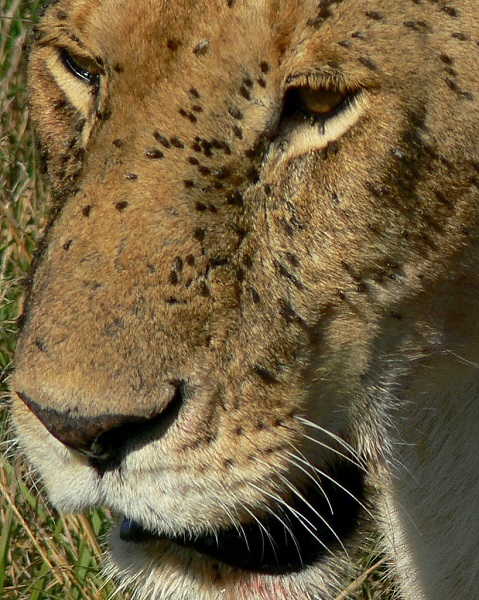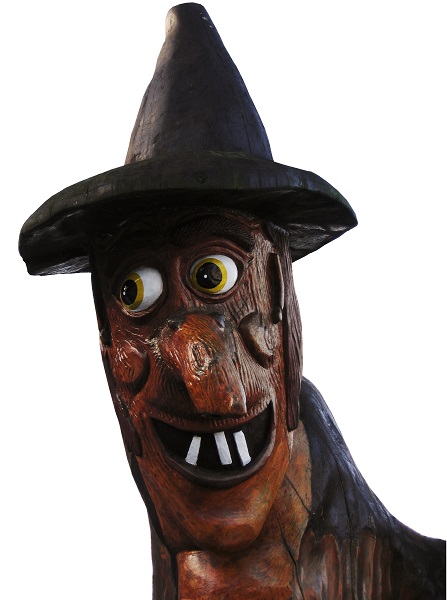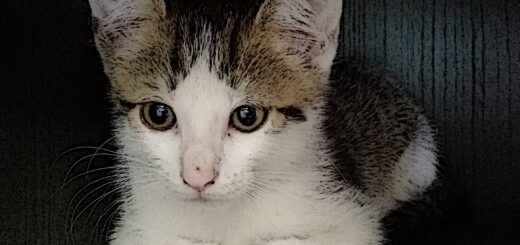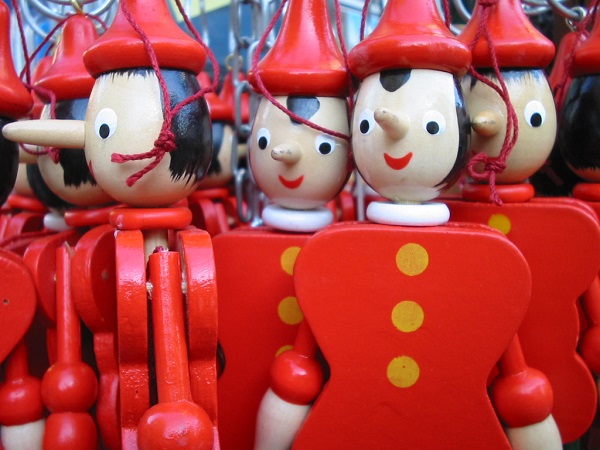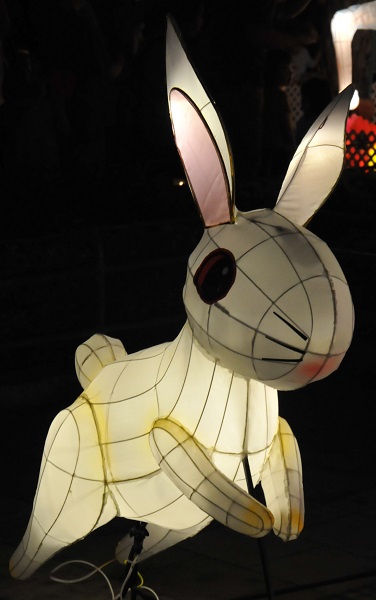Ten Little Legionaries (STORIES OF THE FOREIGN LEGION, 1947) by P. C. WREN
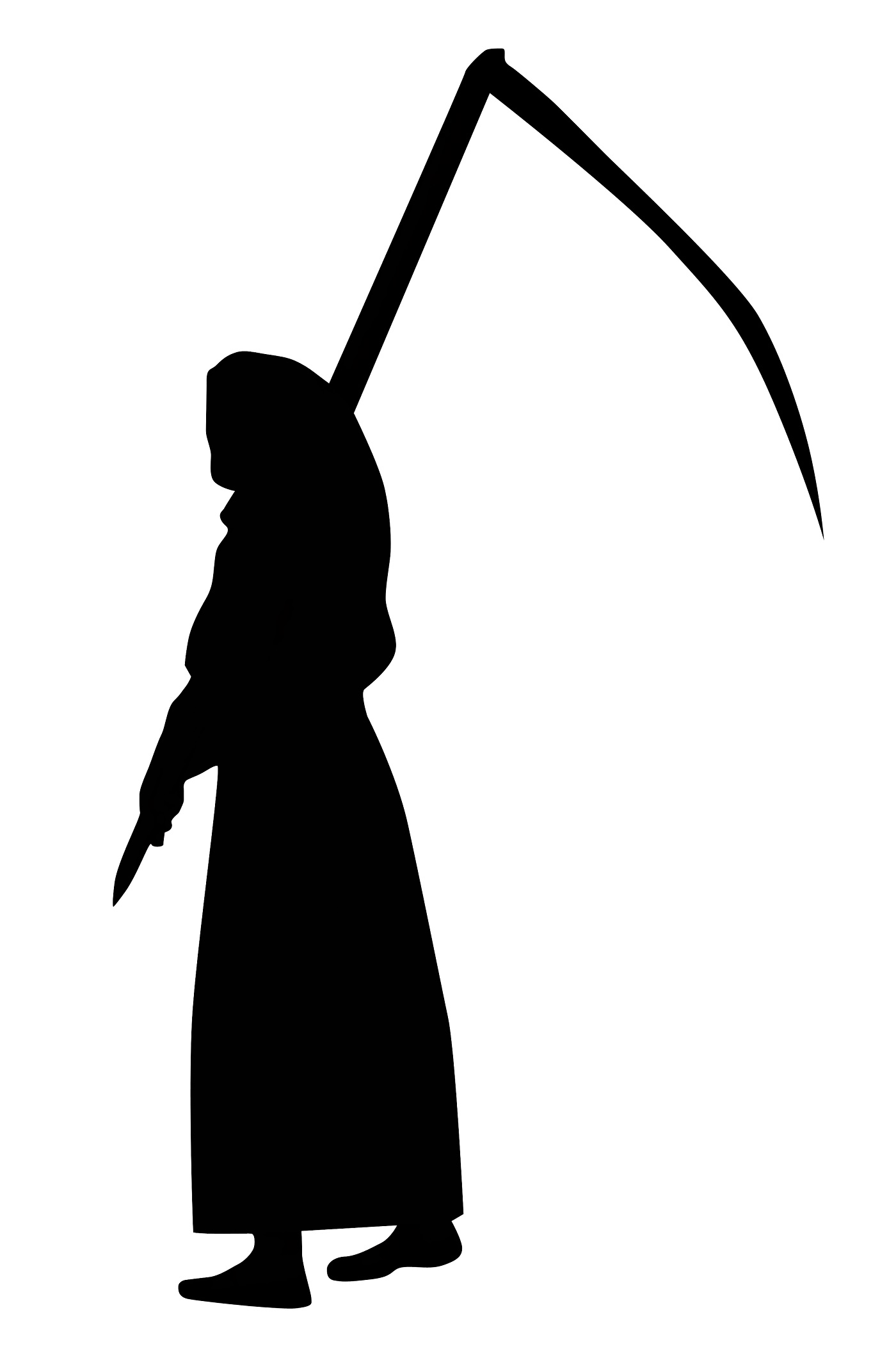
At the Depôt at Sidi bel-Abbès, Sergeant-Major Suicide-Maker was a devil, but at a little frontier outpost in the desert, he was the devil, the increase in his degree being commensurate with the increase in his opportunities. When the Seventh Company of the First Battalion of the First Regiment of the Foreign Legion of France, stationed at Aïnargoula in the Sahara, learned that Lieutenant Roberte was in hospital with a broken leg, it realized that, Captain d’Armentières being absent with the Mule Company, chasing Touareg to the south, it would be commanded for a space by Sergeant-Major Suicide-Maker–in other words by The Devil.
Not only would it be commanded by him, it would be harried, harassed, hounded, bullied, brow-beaten, and be-devilled; it would be unable to call its soul its own and loth so to call its body.
On realizing the ugly truth, the Seventh Company gasped unanimously and then swore diversely in all the languages of Europe and a few of those of Asia and Africa. It realized that it was about to learn, as the Bucking Bronco remarked to his friend John Bull (once Sir Montague Merline, of the Queen’s African Rifles), that it had been wrong in guessing it was already on the ground-floor of hell. Or, if it had been there heretofore, it was now about to have a taste of the cellars.
Sergeant-Major Suicide-Maker had lived well up to his reputation, even under the revisional jurisdiction and faintly restraining curb of Captain d’Armentières and then of Lieutenant Roberte.
Each of these was a strong man and a just, and though anything in the world but mild and indulgent, would not permit really unbridled vicious tyranny such as the Sergeant-Major’s unsupervised, unhampered sway would be. Under their command, he would always be limited to the surreptitious abuse of his very considerable legitimate powers. With no one above him, the mind shrank from contemplating the life of a Legionary in Aïnargoula, and from conceiving this worthy as absolute monarch and arbitrary autocrat.
The number of men undergoing cellule punishment would be limited only by standing room in the cells–each a miniature Black Hole of Calcutta with embellishments. The time spent in drilling at the pas gymnastique 1 and, worse, standing at “attention” in the hottest corner of the red-hot barrack-yard would be only limited by the physical capacity of the Legionaries to run and to stand at “attention.” Never would there be “Rompez” 2 until some one had been carried to hospital, suffering from heat-stroke or collapse. The alternatives to the maddening agony of life would be suicide, desertion (and death from thirst or at the hands of the Arabs), or revolt and the Penal Battalions–the one thing on earth worse than Legion life in a desert station, under a half-mad bully whose monomania was driving men to suicide. Le Cafard, the desert madness of the Legion, was rampant and chronic. Ten legionaries under the leadership of a Frenchman calling himself Blondin, and who spoke perfect English and German, had formed a secret society and hatched a plot. They were going to “remove” Sergeant-Major Suicide-Maker and “go on pump,” as the legionary calls deserting.
1 The “double” march. 2 Dismiss.
Blondin (a pretty, black-eyed, black-moustached Provençal, who looked like a blue-jowled porcelain doll) was an educated man, brilliantly clever, and of considerable personality and force of character. Also he was a finished and heartless scoundrel. His nine adherents were Ramon Diego, a grizzled Spaniard, a man of tremendous physical strength and weak mind; Fritz Bauer, a Swiss, also much stronger of muscle than of brain; a curious Franco-Berber half-caste called Jean Kebir, who spoke perfect Arabic and knew the Koran by heart (Kebir is Arabic for “lion,” and a lion Jean Kebir was, and Blondin had been very glad indeed to win him over, as he would be an invaluable interpreter and adviser in the journey Blondin meant to take); Jacques Lejaune, a domineering, violent ruffian, a former merchant-captain, who could steer by the stars and use a compass; Fritz Schlantz, a wonderful marksman; Karl Anderssen, who had won the médaille for bravery; Mohamed the Turk–just plain Mohamed (very plain); Georges Grondin, the musician, who was a fine cook; and finally the big Moorish negro, Hassan Moghrabi, who understood camels and horses.
The Society had been larger, but Franz Joseph Meyr the Austrian had killed Dimitropoulos the Greek, had deserted alone, and been filleted by the Touareg. Also Alexandre Bac, late of Montmartre, had hanged himself, and La Cigale had gone too hopelessly mad.
It had been for a grief unto Monsieur Blondin that he could by no means persuade old Jean Boule to join. On being sworn to secrecy and “approached” on the subject, ce bon Jean had replied that he did not desire to quit the Legion (Bon sang de Dieu!), and, moreover, that if he went “on pump,” his friends les Légionnaires Rupert, ‘Erbiggin, and le Bouckaing Bronceau would go too–and he did not wish to drag them into so perilous a venture as an attempt to reach the Moroccan coast across the desert from Aïnargoula. Moreover, if he came to know anything of the plot to kill the Sergeant-Major he would certainly warn him, if it were to be a mere stab-in-the-back assassination affair, some dark night. A fair fight is a different thing. If Blondin met the Sergeant-Major alone, when both had their sword-bayonets–that was a different matter. . . .
Monsieur Blondin sheered off, and decided that the less Jean Boule knew of the matter, the better for the devoted Ten. . . .
“Ten little Légionnaires
Going ‘on pump,’
Got away safely
And gave les autres the ‘ump,”
sang Monsieur Blondin, who was very fond of airing his really remarkable knowledge of colloquial English, British slang, clichés, rhymes, and guinguette songs. Not for nothing had he been a Crédit Lyonnais bank-clerk in London for six years. Being a Provençal, he added a pronounced galégeade wit to his macabre Legion-humour.
One terrible day the Sergeant-Major excelled himself–but it was not, as it happened, one of the Ten who attempted to “remove” him.
Having drilled the parade of “defaulters” almost to death, he halted the unfortunate wretches with their faces to a red-hot wall and their backs to the smiting sun, and kept them at “attention” until Tou-tou Boil-the-Cat, an evil liver, collapsed and fell. He was allowed to lie. When, with a crash, old Tant-de-Soif went prone upon his face, paying his dues to Alcohol, the Sergeant-Major gave the order to turn about, and then to prepare to fire. When the line stood, with empty rifles to the shoulder, as in the act of firing, he kept it in the arduous strain of this attitude that he might award severe punishment to the owner of the first rifle that began to quiver or sink downward. As he did so, he lashed and goaded his victims mercilessly and skilfully.
At last, the rifle of poor young Jean Brecque began to sway and droop, and the Sergeant-Major concentrated upon the half-fainting lad the virulent stream of his poisonous vituperation. Having dealt with the subject of Jean, he began upon that of Jean’s mother, and with such horrible foulness of insult that Jean, whose mother was his saint, sprang forward and swung his rifle up to brain the cowardly brute with the butt. As he bounded forward and sprang at the Sergeant-Major, that officer coolly drew his automatic pistol and shot Jean between the eyes.
Had Blondin acted then, his followers, and the bulk of the parade, would have leapt from their places and clubbed the Sergeant-Major to a jelly. But Monsieur Blondin knew that the Sergeant-Major had seven more bullets in his automatic, also that the first man who moved would get one of them, and suicide formed no part of his programme.
“Not just anyhow and anywhere in the trunk, you will observe, scélérats,” remarked the Suicide-Maker coolly, turning Jean over with his foot, “but neatly in the centre of the face, just between the eyes. My favourite spot. Cessez le feu! Attention! Par files de quatre. Pas gymnastique. . . . En avant. . . . Marche!” . . .
The plan was that the Ten, stark naked–so as to avoid any incriminating stains, rents, or other marks upon their garments–should, bayonet in hand, await the passing of the “Suicide-Maker” along a dark corridor that evening. Having dealt with him quietly, but faithfully, they would dress, break out of the post, and set their faces for Morocco at the pas gymnastique.
As for Monsieur Blondin, he was determined that this should be no wretched abortive stroll into the desert, ending in ignominious return and surrender for food and water; in capture by goums 1 in search of the 25 franc reward for the return of a dead or alive deserter; nor in torture and death at the hands of the first party of nomad Arabs that should see fit to fall upon them. Blondin had read the Anabasis of one Xenophon, and an Anabasis to Maroc he intended to achieve on the shoulders, metaphorically speaking, of the faithful nine. Toward the setting sun would he lead them, across the Plain of the Shott, through the country of the Beni Guil, toward the Haut Atlas range, along the southern slopes to the Adrar Ndren, and so to Marakesh and service with the Sultan, or to escape by Mogador, Mazagan, or Dar-el-Beida. No more difficult really than toward Algiers or Oran, and, whereas capture in that direction was certain, safety, once in Morocco, was almost equally sure. For trained European soldiers were worth their weight in silver to the Sultan, and, in his service, might amass their weight in gold. A Moorish villa (and a harem) surrounded by fig-orchards, olive-fields, vineyards, palm-groves, and a fragrant garden of pepper-trees, eucalyptus, walnut, almond, oleander, orange and lemon, would suit Monsieur Blondin well. Oh, but yes! And the Ouled-Naël dancing-girls, Circassian slaves, Spanish beauties. . . .
1 Arab gens d’armes.
The first part of the plan failed, for ce vieux sale cochon of a Jean Boule came along the corridor, struck a match to light his cigarette, saw the crouching, staring, naked Ten, and, being a mad Englishman and an accursed dog’s-tail, saved the life of the Sergeant-Major. That the Ten took no vengeance upon Jean Boule was due to their lack of desire for combat with the mighty Americain, le Bouckaing Bronceau, and with those tough and determined fighters, les Légionnaires Rupert and ‘Erbiggin. All four were masters of le boxe, and, if beaten, knew it not. . . .
The Ten went “on pump” with their wrongs unavenged, save that Blondin stole the big automatic-pistol of the Sergeant-Major from its nail on the wall of the orderly-room.
They took their Lebel rifles and bayonets, an accumulated store of bread and biscuits, water, and, each man, such few cartridges as he had been able to steal and secrete when on the rifle-range, or marching with “sharp” ammunition.
Getting away was a matter of very small difficulty; it would be staying away that would be the trouble. One by one, they went over the wall of the fort, and hid in ditches, beneath culverts, or behind cactus-bushes.
At the appointed rendezvous in the village Négre, the Ten assembled, fell in, and marched off at the pas gymnastique, Blondin at their head. After travelling for some hours, with only a cigarette-space halt in every hour, and ere the stars began to pale, Blondin gave the order “Campez!“, and the little company sank to the ground, cast off accoutrements and capotes, removed boots, and fell asleep. Before dawn Blondin woke them and made a brief speech. If they obeyed him implicitly and faithfully, he would lead them to safety and prosperity; if any man disobeyed him in the slightest particular, he would shoot him dead. If he were to be their leader, as they wished, he must have the promptest and most willing service and subordination from all. There was a terrible time before them ere they win to the Promised Land, but there was an infinitely worse one behind them–so let all who hoped to attain safety and wealth look to it that his least word be their law.
And the Ten Bad Men, desperate, unscrupulous, their hand against every man’s, knowing no restraint nor law but Expedience, set forth on their all but hopeless venture, trusting ce cher Blondin (who intended to clamber from this Slime-pit of Siddim on their carcases, and had chosen them for their various utilities to his purpose).
At dawn, Blondin leading, caught sight of a fire as he topped a ridge, sank to earth, and was at once imitated by the others.
He issued clear orders quickly, and the band skirmished toward the fire, en tirailleur, in a manner that would have been creditable to the Touareg themselves. It was a small Arab douar, or encampment, of a few felidj (low camel-hair tents), and a camel-enclosure. Blondin’s shot, to kill the camel-sentry and bring the Arabs running from their tents, was followed by the steady, independent-firing which disposed of these unfortunates.
His whistle was followed by the charge, which also disposed of the remainder and the wounded, and left the Ten in possession of camels, women, food, weapons, tents, Arab clothing, and money. Fortune was favouring the brave! But the Ten were now Nine, for, as they charged, the old sheikh, sick and weak though he was, fired his long gun into the chest of Karl Anderssen at point-blank range. . . .
An hour later the djemels were loaded up with what Blondin decided to take, the women were killed, and the Nine were again en route for Maroc, enhearted beyond words. There is a great difference between marching and riding, between carrying one’s kit and being carried oneself, and between having a little dry bread and having a fine stock of goat-flesh, rice, raisins, barley, and dates when one is crossing the desert.
In addition to the djemels, the baggage-camels, there were five mehari or swift riding-camels, and, on four of these, Monsieur Blondin had mounted the four men he considered most useful to his purposes–to wit, Jean Kebir, the Berber half-caste who spoke perfect Arabic as well as the sabir or lingua-franca of Northern Africa, and knew the Koran by heart; Hassan Moghrabi, the Moorish negro, who understood camels and horses; Mohamed the Turk, who also would look very convincing in native dress; and Jacques Lejaune, who could use a compass and steer by the stars, and who was a very brave and determined scoundrel.
When allotting the mehari to these four, after choosing the best for himself, Blondin, hand on pistol, had looked for any signs of discontent from Ramon Diego, Fritz Bauer, Fritz Schlantz, or Georges Grondin, and had found none. Also when he ordered that each man should cut the throat of his own woman, and Hassan Moghrabi should dispose of the three superfluous ones, no man demurred. The Bad Men were the less disposed to refuse to commit cold-blooded murder because the stories of the tortures inflicted upon the stragglers and the wounded of the Legion are horrible beyond words–though not more horrible than the authentic photographs of the tortured remains of these carved and jointed victims, that hang, as terrible warnings to deserters, in every chambrée of the casernes of the Legion. They killed these women at the word of Blondin–but they knew that the women would not have been content with the mere killing of them, had they fallen into the hands of this party of Arabs.
As, clad in complete Arab dress, they rode away in high spirits, le bon Monsieur Blondin sang in English, in his droll way–
“Ten little Légionnaires
Charging all in line–
A naughty Arab shot one
And then–there were Nine.”
The Nine rode the whole of that day and, at evening, Blondin led them into a wadi or canyon, deep enough for concealment and wide enough for comfort. Here they camped, lit fires, and Georges Grondin made a right savoury stew of kid, rice, raisins, barley, dates, and bread in an Arab couscouss pot. The Nine slept the sleep of the just and, in the morning, arose and called ce bon Blondin blessed. With camels, food, cooking-pots, sleeping-rugs, tents, clothing, extra weapons, and much other useful loot, hope sprang strong as well as eternal in their more or less human breasts.
Blondin led them on that day until they had made another fifty miles of westing, and halted at a little oasis where there was a well, a kuba (or tomb of some marabout or other holy person), and a small fondouk or caravan rest-house. Jean Kebir having reconnoitred and declared the fondouk empty, and the place safe, they watered their camels, occupied the fondouk, and, after a pleasant evening and a good supper, slept beneath its hospitable and verminous shelter–four of the party being on sentry-go, for two hours each, throughout the night.
At this place, the only human beings they encountered were a horrible disintegrating lump of disease that hardly ranked as a human being at all, and an ancient half-witted person who appeared to combine the duties of verger and custodian of the kuba with those of caretaker and host of the fondouk. Him, Jean Kebir drove into the former building with horrible threats. Fortunately for himself, the aged party strictly conformed with the orders of Kebir, for Blondin had given the Berber instructions to dispatch him forthwith to the joys of Paradise if he were seen outside the tomb. Next day, as the party jogged wearily along, Blondin heard an exclamation from Jean Kebir and, turning, saw him rein in his mehara and stare long and earnestly beneath his hand toward the furthermost sand-hills of the southern horizon. On one of these, Blondin could make out a speck. He raised his hand, and the little cavalcade halted.
“What is it?” he asked of Kebir.
“A Targui scout,” was the reply. “We shall be attacked by Touareg–now if they are the stronger party, to-night in any case–unless we reach some ksar 1 and take refuge. . . . That might be more dangerous than waiting for the Touareg, though.”
1 Fortified village.
“How do you know the man is a Targui?” asked Blondin.
“I do not know how I know, but I do know,” was the reply. “Who else would sit all day motionless on a mehara on top of a sand-hill but a Targui? The Touareg system is to camp in a likely place and keep their horses fresh while a chain of slaves covers a wide area around them. In bush country they sit up in trees, and in the desert they sit on camels, as that fellow is doing. Directly they spot anything, they rush off and warn their masters, who then gallop to the attack on horseback if they are in overwhelming strength, or wait until night if they are not.”
Even as he spoke the watcher disappeared.
“Push on hard,” ordered Blondin, and debated as to whether it would be better for the mehari-mounted five to desert the djemel-mounted four and escape, leaving them to their fate, or to remain, a band of nine determined rifles. Union is strength, and there is safety in numbers–so he decided that the speed of the party should be that of the well-flogged djemels.
“Goad them on, mes enfants,” cried he to Diego, Bauer, Schlantz, and Grondin. “I will never desert you–but you must put your best leg foremost. We are nine, and they may be ninety or nine hundred, these sacrés chiens of Touareg.” An hour of hard riding, another–with decreasing anxiety, and suddenly Blondin’s sharp, clear order:
“Halte! . . . Formez le carré! . . . Attention pour les feux de salve!” as, with incredible rapidity, an avalanche of horsemen appeared over a ridge and bore down upon them in a cloud of dust, with wild howls of “Allah Akbar!” . . . “Lah illah il Allah!” and a rising united chant. “Ul-ul-ul-ul Ullah Akbar.”
Swiftly the trained legionaries dismounted, knelt their camels in a ring, took cover behind them, and, with loaded rifles, awaited their leader’s orders. Coolly Blondin estimated the number of this band of The-Forgotten-of-God, the blue-clad, Veiled Men of the desert. . . . Not more than twenty or thirty. They would never have attacked had not their scout taken the little caravan to be one of traders, some portion of a migrating tribe, or, perchance, a little gang of smugglers, traders of the Ouled-Ougouni or the Ouled-Sidi-Sheikhs, or possibly gun-running Chambaa taking German rifles from Tripoli to Morocco–a rich prey, indeed, if this were so. Each Chambi would fight like Ibliss himself though, if Chambaa they were, for such are fiends and devils, betrayers of hospitality, slayers of guests, defilers of salt, spawn of Jehannum, who were the sons and fathers of murderers and liars. Moreover, they would be doubly watchful, suspicious, and resolute if they, French subjects, were smuggling German guns across French territory into Morocco under the very nose of the Bureau Arabe. . . . However, there were but nine of them, in any case, so Ul-ul-ul-ul-ul Ullah Akbar!
“Don’t fire till I do–and then at the horses, and don’t miss,” shouted Blondin.
The avalanche swept down, and lances were lowered, two-handed swords raised, and guns and pistols presented–for the Touareg fire from the saddle at full gallop.
Blondin waited.
Blondin fired. . . . The leading horse and rider crashed to the ground and rolled like shot rabbits. Eight rifles spoke almost simultaneously, and seven more men and horses spun in the dust. At the second volley from the Nine, the Touaregs broke, bent their horses outward from the centre of the line, and fled. All save one, who either could not, or would not, check his maddened horse. Him Blondin shot as his great sword split the skull of Fritz Bauer, whose poor shooting, for which he was notorious, had cost him his life.
“Cessez le feu,” cried Blondin, as one or two shots were fired after the retreating Arabs. “They won’t come back, so don’t waste cartridges. . . . See what hero can catch me a horse.”
As he coolly examined the ghastly wound of the dying Fritz Bauer, he observed to the faithful Jean Kebir “Habet!” and added–
“Nine little Légionnaires–
But one fired late
When a Touareg cut at him–
And so there were Eight.“
“Eh bien, mon Capitaine?” inquired Kebir.
“N’importe, mon enfant!” smiled Monsieur Blondin, and turned his attention to the property and effects of the dying man. . . .
“We shall hear more of these Forsaken-of-God before long,” observed Jean Kebir when the eight were once more upon their way.
They did. Just before sunset, as they were silhouetted against the fiery sky in crossing a sand-hill ridge, there was a single shot, and Georges Grondin, the cook, grunted, swayed, observed “Je suis bien touché,” and fell from his camel.
Gazing round, Blondin saw no signs of the enemy. The plain was empty of life–but there might be hundreds of foemen behind the occasional aloes, palmettos, and Barbary cacti; crouching in the driss, or the thickets of lentisks and arbutus and thuyas. Decidedly a place to get out of. If a party of Touareg had ambushed them there, they might empty every saddle without showing a Targui nose. . . .
A ragged volley was fired from the right flank.
“Ride for your lives,” he shouted, and set an excellent example to the other seven.
“What of Grondin?” asked Kebir, bringing his mehara alongside that of Blondin.
“Let the dead bury their dead,” was the reply. (Evidently the fool had not realized that the raison d’être of this expedition was to get one, Jean Blondin, safe to Maroc!)
An hour or so later, in a kind of little natural fortress of stones, boulders, and rocks, they encamped for the night, a sharp watch being kept. But while Monsieur Blondin slept, Jean Kebir, who was attached to Georges Grondin, partly on account of his music and partly on account of his cookery, crept out, an hour or so before dawn, and stole back along the track, in the direction from which they had come.
He found his friend at dawn, still alive; but as he had been neatly disembowelled and the abdominal cavity filled with salt and sand and certain other things, he did not attempt to move him. He embraced his cher Georges, bade him farewell, shot him, and returned to the little camp.
As the cavalcade proceeded on its way, Monsieur Blondin, stimulated by the brilliance and coolness of the glorious morning, and by high hopes of escape, burst into song.
“Eight little Légionnaires
Riding from ‘ell to ‘eaven,
A wicked Targui shot one–
And then there were Seven,“
improvised he. . . .
Various reasons, shortness of food and water being the most urgent, made it desirable that they should reach and enter a small ksar that day.
Towards evening, the Seven beheld what was either an oasis or a mirage–a veritable eye-feast in any case, after hours of burning desolate desert, the home only of the hornéd viper, the lizard, and the scorpion.
It proved to be a small palm-forest, with wells, irrigating-ditches, cultivation, pigeons, and inhabitants. Cultivators were hoeing, blindfolded asses were wheeling round and round noria wells, veiled women with red babooshes on their feet bore brightly coloured water-vases on their heads. Whitewashed houses came into view, and the cupola of an adobe-walled kuba.
Jean Kebir was sent on to reconnoitre and prospect, and to use his judgment as to whether his six companions–good men and true, under a pious vow of silence–might safely enter the oasis, and encamp.
While they awaited his return, naked children came running towards them clamouring for gifts. They found the riders dumb, but eloquent of gesture–and the gestures discouraging.
Some women brought clothes and commenced to wash them in an irrigation stream, on some flat stones by a bridge of palm trunks. The six sat motionless on their camels.
A jet-black Haratin boy brought a huge basket of Barbary figs and offered it–as a gift that should bring a reward. At a sign from Blondin, Mohamed the Turk took it and threw the boy a mitkal.
“Salaam,” said he.
“Ya, Sidi, Salaam aleikoum,” answered the boy, with a flash of perfect teeth.
Blondin glared at Mohamed. Could not the son of a camel remember that the party was dumb–pious men under a vow of silence? It was their only chance of avoiding discovery and exposure as accursed Roumis 1 when they were near the habitations of men.
1 Europeans.
A burst of music from tom-tom, derbukha, and raita broke the heavy silence, and then a solo on the raita, the “Voice of the Devil,” the instrument of the provocative wicked note. Some one was getting born, married, or buried, apparently.
Fritz Schlantz, staring open-mouthed at cyclamens, anemones, asphodels, irises, lilies, and crocuses between a little cemetery and a stream, was, for the moment, back in his Tyrolese village. He shivered. . . .
Jean Kebir returned. He recommended camping on the far side of the village at a spot he had selected. There were strangers, heavily armed with yataghans, lances, horse-pistols, flissas, and moukalas in the fondouk. In addition to the flint-lock moukalas there were several repeating rifles. They were all clad in burnous and chechia, and appeared to be half-trader, half-brigand Arabs of the Tableland, perhaps Ouled-Ougouni or possibly Aït-Jellal. Anyhow, the best thing to do with them was to give them a wide berth.
The Seven passed through the oasis and, camping on the other side, fed full upon the proceeds of Kebir’s foraging and shopping.
That night, Fritz Schlantz was seized with acute internal pains, and was soon obviously and desperately ill.
“Cholera!” said Monsieur Blondin on being awakened by the sufferer’s cries and groans. “Saddle up and leave him.”
Within the hour the little caravan had departed, Jacques Lejaune steering by the stars. To keep up the spirits of his followers Monsieur Blondin sang aloud.
First he sang–
“Des marches d’Afrique
J’en ai pleine le dos.
On y va trop vite.
On n’y boit que de l’eau.
Des lauriers, des victoires,
De ce songe illusoire
Que l’on nomme ‘la gloire,’
J’en ai plein le dos,”
and then Derrière l’Hôtel-Dieu, and Père Dupanloup en chemin de fer. In a fine tenor voice, and with great feeling, he next rendered L’Amour m’a rendu fou, and then, to a tune of his own composition, sang in English–
“Seven little Légionnaires
Eating nice green figs,
A greedy German ate too much–
And then there were Six.”
Day after day, and week after week, the legionaries pushed on, sometimes starving, often thirsty, frequently hunted, sometimes living like the proverbial coq en pâte, or, as Blondin said, “Wee peegs in clover,” after ambushing and looting a caravan.
Between Amang and Illigh lie the bones of Jacques Lejaune, who was shot by Blondin. As they passed out of the dark and gloomy shade of a great cedar forest, there was a sudden roar, and a lioness flung herself from a rock upon Lejaune’s camel. Lejaune was leading as the sun had set. Blondin, who was behind him, fired quickly, and the bullet struck him in the spine and passed out through his shattered breast-bone. He had been getting “difficult” and too fond of giving himself airs on the strength of his navigating ability, and, moreover, Monsieur Blondin had learnt to steer by the stars, having located the polar star by means of the Great Bear. Jean Kebir shot the lioness through the head.
It was a sad “accident” but Blondin had evidently recovered his spirits by morning, as he was singing again.
He sang–
“Six little Légionnaires
Still all live,
But one grew indiscipliné–
And then there were Five.” . . .
Distinctly of a galégeade wit and a macabre humour was Monsieur Blondin, and even as his eye roamed over the scrubby hill-sides and he thought fondly of the mussugues, the cistus-scrub hillocks of his dear Provence, he calculated the total sum of money now divided among the said Five, and reflected that division, where money is concerned, is deplorable. Also, as he gazed upon the tracts of thorn that recalled the argeras of Hyères, he decided that, all things considered, it would be as well for him to reach Marakesh alone. He understood the principle of rarity-value, and knew that either one of two newcomers would not fetch a quarter of the price of a single newcomer to a war-harassed Sultan whose crying need was European drill-sergeants and centurions.
Jean Blondin would rise to be a second Kaid McLeod, and would amass vast wealth to boot. . . .
At Aït-Ashsba, bad luck overtook Ramon Diego. At the fondouk he smote a burly negro of Sokoto who jostled him. The negro, one of a band of departing wayfarers, was a master of the art of rabah, the native version of la savate, and landed Ramon a most terrible kick beneath the breast-bone. As he lay gasping and groaning for breath, the negro whipped out his razor-edged yataghan and bent over the prostrate man. Holding aloof, Blondin saw the negro spit on the back of Ramon Diego’s neck, and with his finger draw a line thereon. Stepping swiftly back, the gigantic black then smote with all his strength, and the head of Ramon Diego rolled through the doorway and down the stony slope leading from the fondouk. As the negro mounted his swift Filali camel, Blondin investigated the contents of a leather bag which Ramon always wore at the girdle, beneath his haik. On being told of the mishap, Jean Kebir was all for pursuit and vengeance. This, Blondin vetoed sternly. There were now only four of them, and henceforth they must walk delicately and be miskeen, modest, humble men. Only four now!
“Five little Légionnaires,
Each man worth a score;
But a big nigger ‘it one–
And then there were Four,“
sang Monsieur Blondin.
But what a four! Jean Kebir, the genuine local article, more or less; Hassan Moghrabi, near his native heath and well in the picture; Mohamed the Turk, a genuine Mussulman, able to enter any mosque or kuba and display his orthodoxy; and himself, a pious man hooded to the eyes, under a vow of silence.
In due course, the Four reached the Adrar highlands, and tasted of the hospitality of this grim spot, with its brigands’ agadirs or castles of stone. A band swooping down upon them from an agadir (obviously of Phœnician origin), pursued them so closely and successfully, that Mohamed, the worst mounted, bringing up the rear, was also brought to earth by a lance-thrust through his back, and ended his career hanging by the flesh of his thigh from a huge hook which protruded from the wall above the door of the agadir.
Though greatly incensed at the loss of the Turk’s camel and cash, Monsieur Blondin was soon able to sing again.
“Four little Légionnaires
Out upon the spree,
The Adrar robbers caught one–
And soon there were Three,” . . .
he chanted merrily.
As the Three watched some hideous Aïssa dervishes dancing on glowing charcoal, skewering their limbs and cheeks and tongues, eating fire, and otherwise demonstrating their virtue one night, near Bouzen, a djemel, thrusting forth his head and twisting his snaky neck, neatly removed the right knee-cap of Hassan Moghrabi, and he was of no further use to Monsieur Blondin. He was left behind, and died in a ditch some three days later, of loss of blood, starvation, gangrene, and grief.
Clearly Jean Blondin was reserved for great things. Here were the Ten reduced to Two, and of those two he was one–and intended to be the only one when he was safe in Maroc. Singing blithely, he declared that–
“Three little Légionnaires
Nearly travelled through,
When a hungry camel ate one–
And now there are but Two.” . . .
On through the beautiful Adrar, past its forests of arbutus, lentisk, thuya, figs, pines, and palmettos to its belt of olive groves, walnut, and almond; on toward Djebel Tagharat, the Lord of the Peaks, the Two-Headed. On through the Jibali country, called the “Country of the Gun” by the Arabs, as it produces little else for visitors, toward the Bled-el-Maghzen, the “Government’s Territory,” experiencing many and strange adventures and hair-breadth escapes. And, all the way, Jean Kebir served his colleague and leader well, and often saved him by his ready wit, knowledge of the country and the sabir, and his good advice.
And in time they reached the gorge of Bab el Jebel, and rode over a carpet of pimpernels, larkspur, gladioli, hyacinths, crocuses, wasp-orchids, asphodels, cyclamens, irises and musk-balsams; and Blondin realized that it was time for Jean Kebir to die, if he were to ride to Marakesh alone and to inherit the whole of what remained of the money looted in the fifteen-hundred-mile journey, that was now within fifteen hours of its end. . . .
He felt quite sad as he shot the sleeping Jean Kebir that night, but by morning was able to sing–
“Two little Légionnaires
Travelling with the sun,
Two was one too many–
So now there is but One,“
and remarked to his camel, “‘Finis coronat opus,‘ mon gars.” . . .
Even as he caught sight, upon the horizon, of the sea of palms in which Marakesh is bathed, he was aware of a rush of yelling, gun-firing, white-clad lunatics bearing down upon him. . . . A Moorish harka! Was this a lab-el-baroda, a powder-play game–or what? They couldn’t be shooting at him. . . . What was that Kebir had said? . . . “The Moors are the natural enemies of the Arabs. We must soon get Moorish garb or hide”–when . . . a bullet struck his camel and it sprawled lumberingly to earth. Others threw up spouts of dust. Blondin sprang to his feet and shouted. Curse the fools for thinking him an Arab! Oh, for the faithful Jean Kebir to shout to them in the sabir lingua franca! . . . A bullet struck him in the chest. Another in the shoulder. He fell.
As the Moors gathered round to slice him in strips with flissa, yataghan and sword, they found that their prey was apparently expending his last breath in prayers and pæans to Allah. He gasped:
“One little Légionnaire,
To provide le bon Dieu fun,
Was killed because he killed his friend–
And now there is None.” . . .
There was.
Decidedly of a galégeade wit and a macabre humour to the very last–ce bon Jean Blondin.
“Que voulez-vous? C’est la Légion!” . . .

